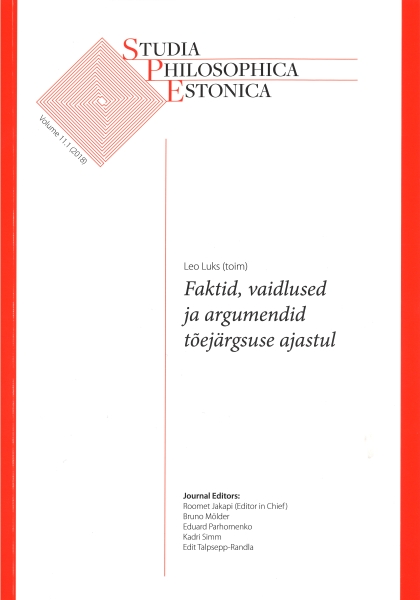Post-Truth as a Procrastination of Enlightenment
DOI:
https://doi.org/10.12697/spe.2018.11.1.07Keywords:
post-truth politics, argumentum ad passiones, Sweden argument, appeal to emotion, rational representationalismAbstract
In recent years the cultural pessimistic position has become known, according to which we live in an “age of post-truth.” This thesis is supported by the observation of an increasing use of argumenta ad passiones in politics. In contrast to this view, I believe that “time” and “representation” play a more decisive role in individual post-truth arguments than the appeal to passiones. By analysing typical post-truth arguments, I arrive at a much more positive view on the present age: the designation of individual arguments as “post-truth” is already an expression of a process of enlightenment.
References
Brandom, R. (2000). Articulating Reasons: An Introduction to Inferentialism. Cambridge, Mass.: Harvard University Press
Dummett, M. A. E. (1994). The Logical Basis of Metaphysics. Cambridge, Mass: Harvard University Press.
Goodman, N. (1968). Languages of art: An Approach to a Theory of Symbols, Bobbs-Merrill, Indianapolis, Ind.
McDowell, J. (1994). Mind and world: With a new introduction, Harvard University Press, Cambridge, Mass.
Peregrin, J. (2014). Inferentialism, Palgrave Macmillan, New York, N.Y.
Price, H. 2013. Prospects for Global Expressivism, in H. Price, S. Blackburn, R. Brandom, P. Horwich, M. Williams (eds.), Expressivism, Pragmatism and Representationalism, Cambridge University Press, Cambridge, pp. 145-194.
Rorty, R. (1980). Philosophy and the Mirror of Nature, Princeton U.P., Princeton, N.J.
Sellars, W. (1968). Science and Metaphysics: Variations on Kantian Themes, Routledge & Kegan Paul, London.





